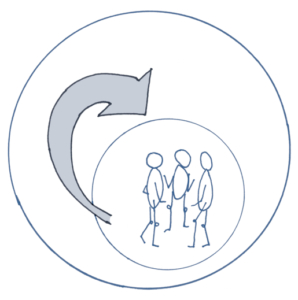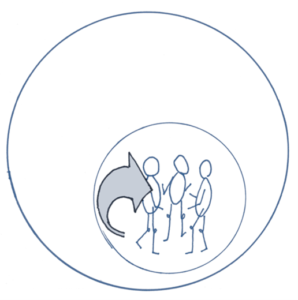Systems need three types of leadership, simultaneously!
Systemic leadership, what does that actually mean? It’s about a lot of different things: about yourself, about the systems you’re in, and about the relationships within and between the systems. Several years ago, I wrote a book about this subject, together with Jan Jacob Stam: Tegen de Stroom mee – systemisch leiderschap (Systemic Leadership).
But in this blog, I want to focus on the three types of systemic leadership that an organizational system needs. Whom does the system need to provide that leadership? Actually everyone, but in any case the formally appointed leaders…
Do you have a position of leadership in an organization? Then you can apply these three forms of leadership. Are you not equally skilled in all three forms? Then see which elements you can outsource or make other arrangements for.
- Agency leadership
Agency stands for “driving force”, or “that which sets everything in motion”. A system first of all needs agency force, to ensure that the system can exist autonomously. This requires clear frameworks: what do you do and what not, what are the guiding principles and where does the money come from?
This type of leadership is strongly connected to the outside world at the level of the organization as a whole. What is going on in society, in the market, around us, what type of (r)evolutionary developments are coming our way? Agency leadership knows how to translate this into the right direction for the organization. It develops the contours and frameworks within which the organization can exist, in which it has life force and the potential to flow.
Agency leaders are also the designated leaders who liaise with key stakeholders, financial backers, public policy makers and also with those whom they (hierarchically) are accountable to.
They ensure that the whole (the organization resp. the team) has a place and destination in the larger whole (in society resp. the organization).
Agency leadership is needed for the organization as a whole, as well as for the subsystems within it. This means that agency leadership is not only required of the person who is highest up in the hierarchy, such as a CEO, managing director or general manager. Agency leadership is also required of heads of departments, team leaders and coordinators etc. Agency leadership is also required in a self-managing or self-organizing team, so it pays to agree on who will fulfil this agency role.
- Operational leadership
Organizations and teams have a core function, they have to deliver results, products and/or services. This is their destiny and their purpose, and it requires substantive knowledge of the subject matter. This requires passion for your profession, awareness of the quality and quantity it requires to deliver what fits within the framework set by the agency leadership. This requires being open to developments and innovation.
In the arrangement, operational leadership comes after agency leadership.
- Communion leadership
Communion stands for “community, being part of something, safety”. Communion leadership is about facilitating the proper performance of the core function of the organization or a team. This varies from providing very practical leadership, by ensuring the necessary facilities are in place, to providing unifying leadership, by ensuring everyone feels part of the whole.
 It’s about well-being, about connection, about (personal) development and collaboration. And also about the fact that the technology is working, human resources are up and running and the accommodation and facilities are in order.
It’s about well-being, about connection, about (personal) development and collaboration. And also about the fact that the technology is working, human resources are up and running and the accommodation and facilities are in order.
This type of leadership is strongly connected to the inner world of the organization or the team as a whole, and to how the individuals within it are doing. In the arrangement, communion leadership comes after agency and operational leadership; it serves the core function, the people and the whole.
Why does the arrangement matter?
First of all: it is about the order, not about who is “better”. All three forms of systemic leadership are equally needed. If one is missing, or is not as well represented as the others, this will affect the whole.
If the order is clear, then there is no need to discuss it. It saves time and energy!
The most reassuring arrangement of the three forms of leadership is:
- Agency
- Operational
- Communion
How does this work with a two- or three-member executive team?
In the case of two leaders, the qualities are ideally distributed in such a way that one of them takes on more of the agency leadership role, and the other more of the communion leadership role. The outside and inside world can clearly see that the roles are divided in this way. This provides clarity and reassurance in the arrangement, both to the two leaders themselves, and to the rest of the organization. Operational leadership may therefore rest with one of the two leaders, or be delegated to an expert.
With three leaders, it goes without saying that the ideal situation is that each of them takes on one of the types of systemic leadership, so that all three are represented.
Can one person take on all these three forms of leadership?
Yes.
If you are the leader who has final responsibility, you have to deploy all three of these forms of systemic leadership. You always have to observe and ask yourself: which form of leadership is needed at this moment in time? There are times when you have to focus on agency leadership more, and times when you have to focus on operational or communion leadership. You can definitely be equally proficient in all three forms.
Sometimes it is difficult for a leader to use all three types. This is especially true of leaders who are appointed in a general leadership position because they are experts in their field. For example, if you are a top lawyer and trade in your law practice for the position of Director of Legal Affairs of a multinational company. Or if you are a surgeon and become the managing director of a regional hospital.
It is good to check for yourself which of the three types of systemic leadership comes naturally to you, and which you still have to develop further.
Who does what?
In more homogeneous teams that have no or a very limited hierarchical organization, it is helpful to mutually agree on who to go to if you:
- Need agency. If you have questions about the corporate or team identity, about what we are or are not, about the direction, destination, guiding principles and about developments and prospects.
- Need operational input. For example, if you have discovered something new, have a suggestion for an improvement of a product, service or procedure, or if you are unsure how to implement something.
- Need communion. If you need “hard and soft” support in the execution of your work. If you have ideas or need a decision about interconnections, staff excursions, ICT, facilities or personal development.
This blog is a companion piece to the book Tegen de Stroom Mee – over systemisch leiderschap.
Working with multiple (executive) teams, I have discovered that you can translate the systems’ need for autonomy and well-being into different systemic leadership styles.
Even in my own role as leader of our institute, I am aware that I demonstrate three systemic leadership styles. And that how I divide my time, energy and attention to these styles is not always done consciously. It is good to occasionally take a step back and ask yourself: what does the system (and what do my colleagues) need from me? Do I need to offer more agency, operational or communion leadership? And also: how am I doing, and which style is costing me more or less energy right now? If I’m not able to show communion leadership for a while, it is better to be honest about it and take some time for myself, for example. Or if I feel agency leadership is needed, but I can’t quite get a grip on the situation, I ask if a colleague would like to spar with me. As a leader, you don’t have to go it alone…
Want to learn more about systemic work and constellations?
Knowledge
Books, blogs and videos: our trainers are happy to share their knowledge, experience and insights on systemic work.
About BHI
The Bert Hellinger Institute is your training, knowledge and research centre for systemic work. Find out more about our team, locations and history.
FAQs
Are you new here or is something not clear? Check out the FAQs about systemic work in general or the Bert Hellinger Institute.
Subscribe to our newsletter
We send the latest blogs, vlogs and our course offerings monthly through our newsletter. Stay informed and subscribe.
SubscribeAbout the Bert Hellinger Institute
People are constantly evolving. With each other, without each other. In families, in teams, in organizations. Systemic thinking makes us aware of the “why” of our being and doing. Organizational and family constellations create room for movement. The BHI provides courses, workshops and training programs in the field of systemic work, constellations, leadership and coaching. This is how we contribute to the development of people, organizations and society.

